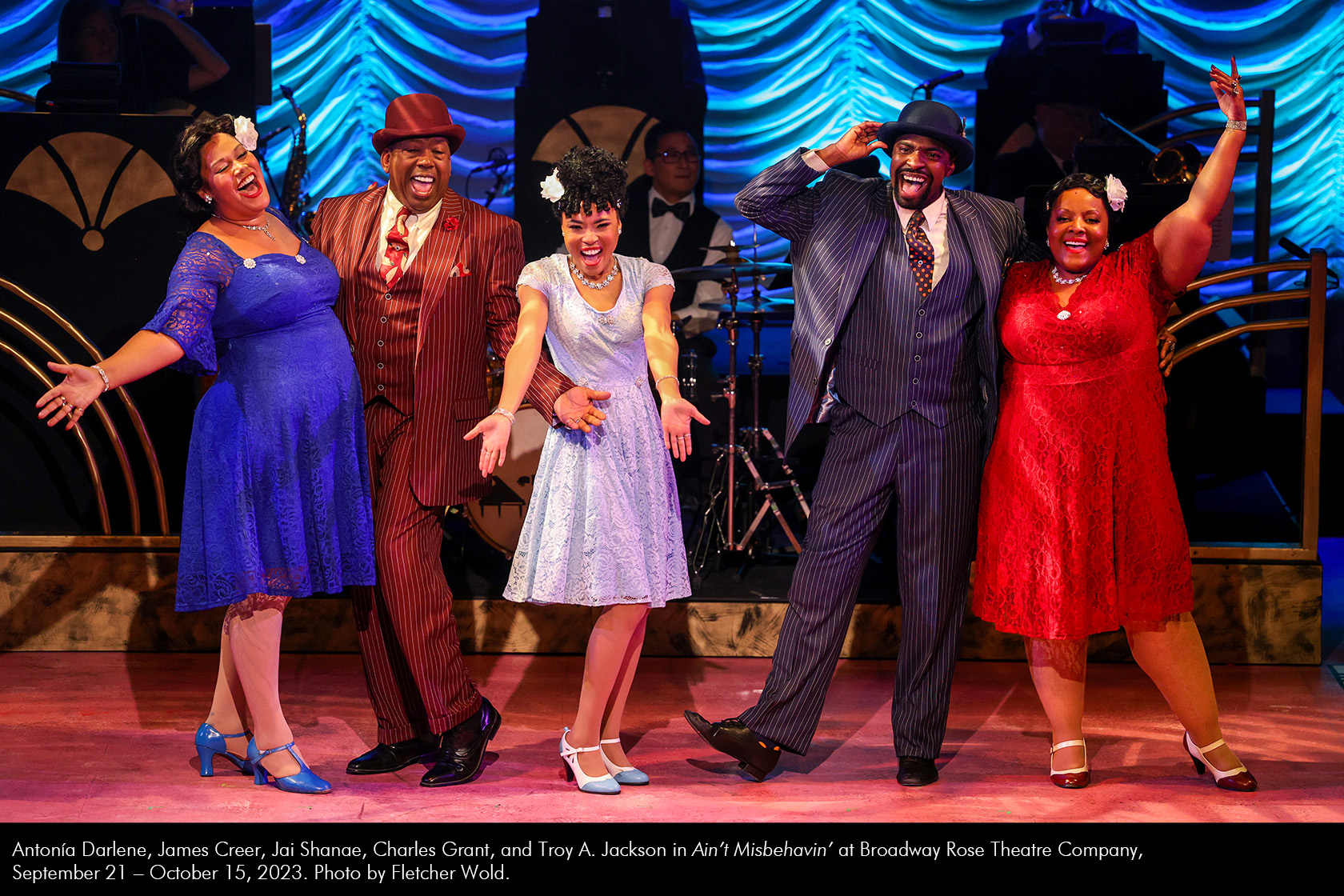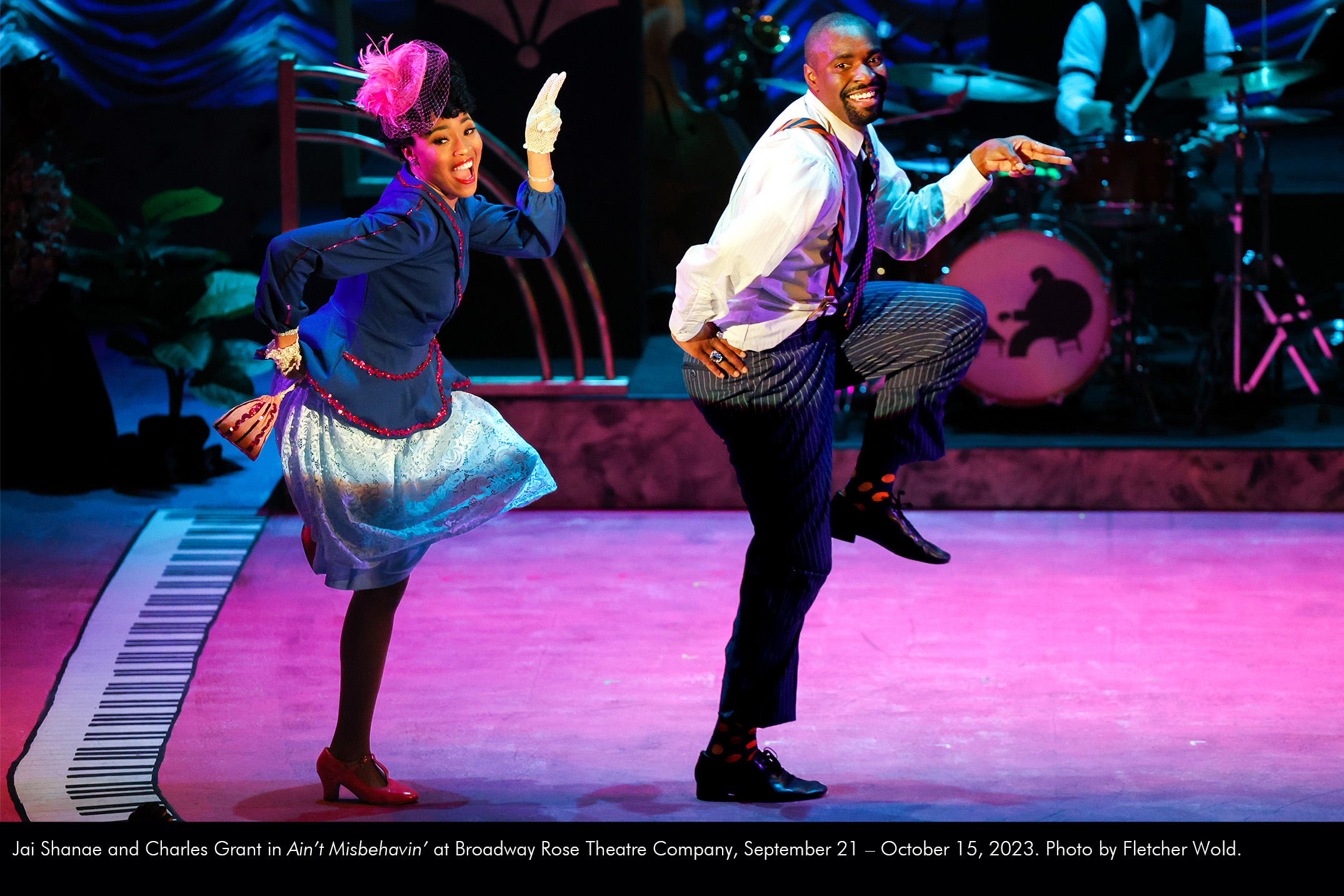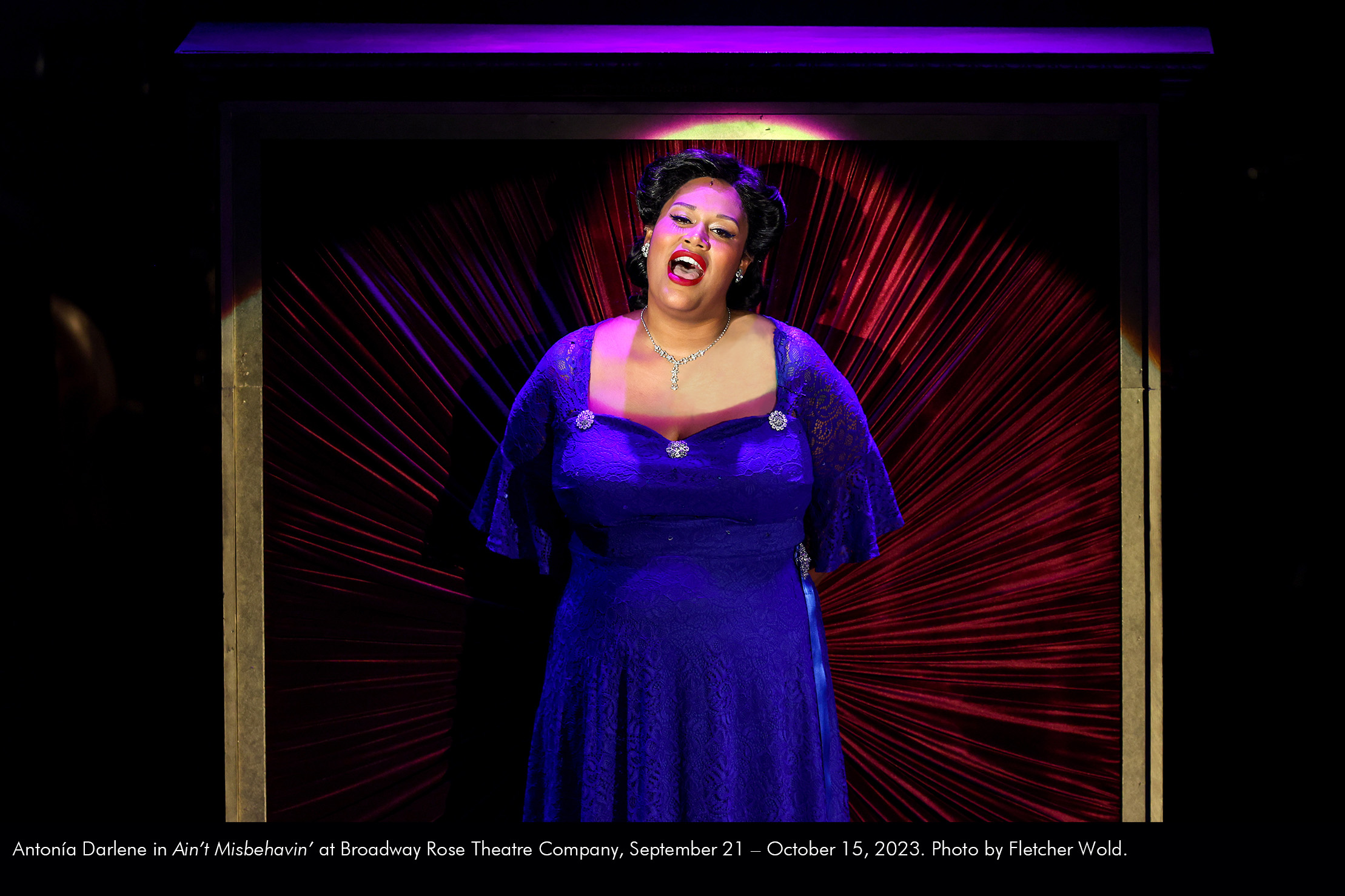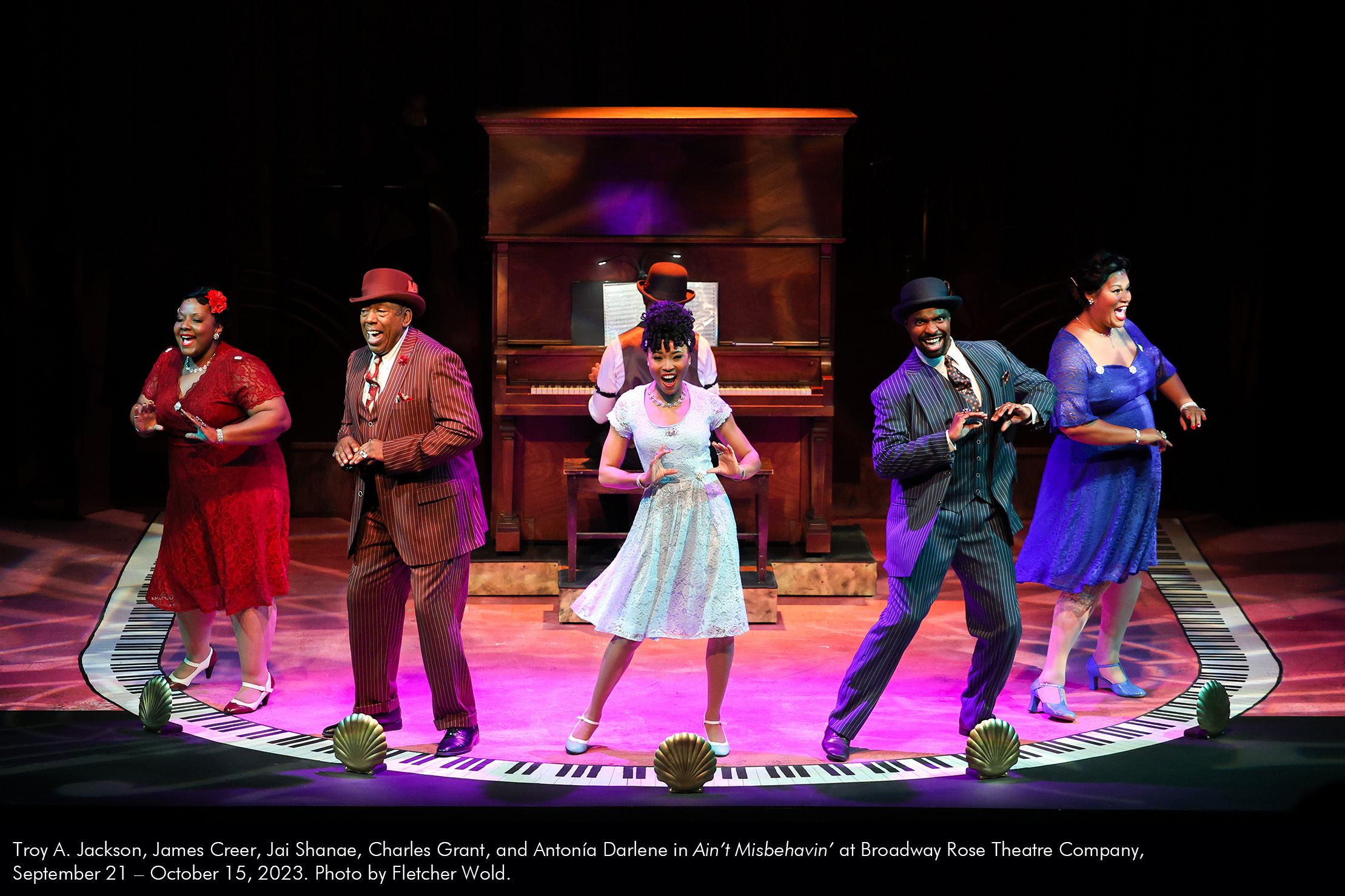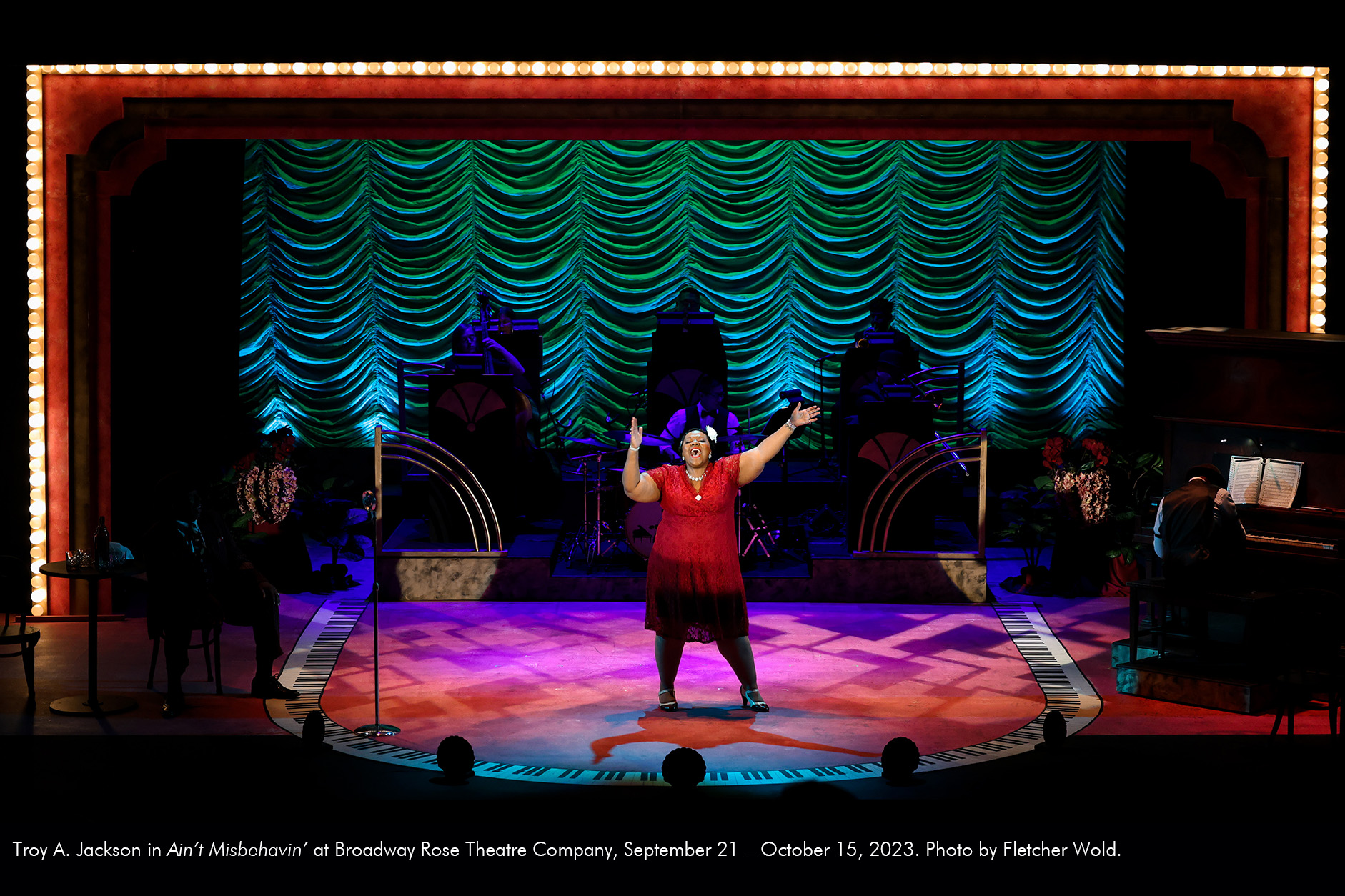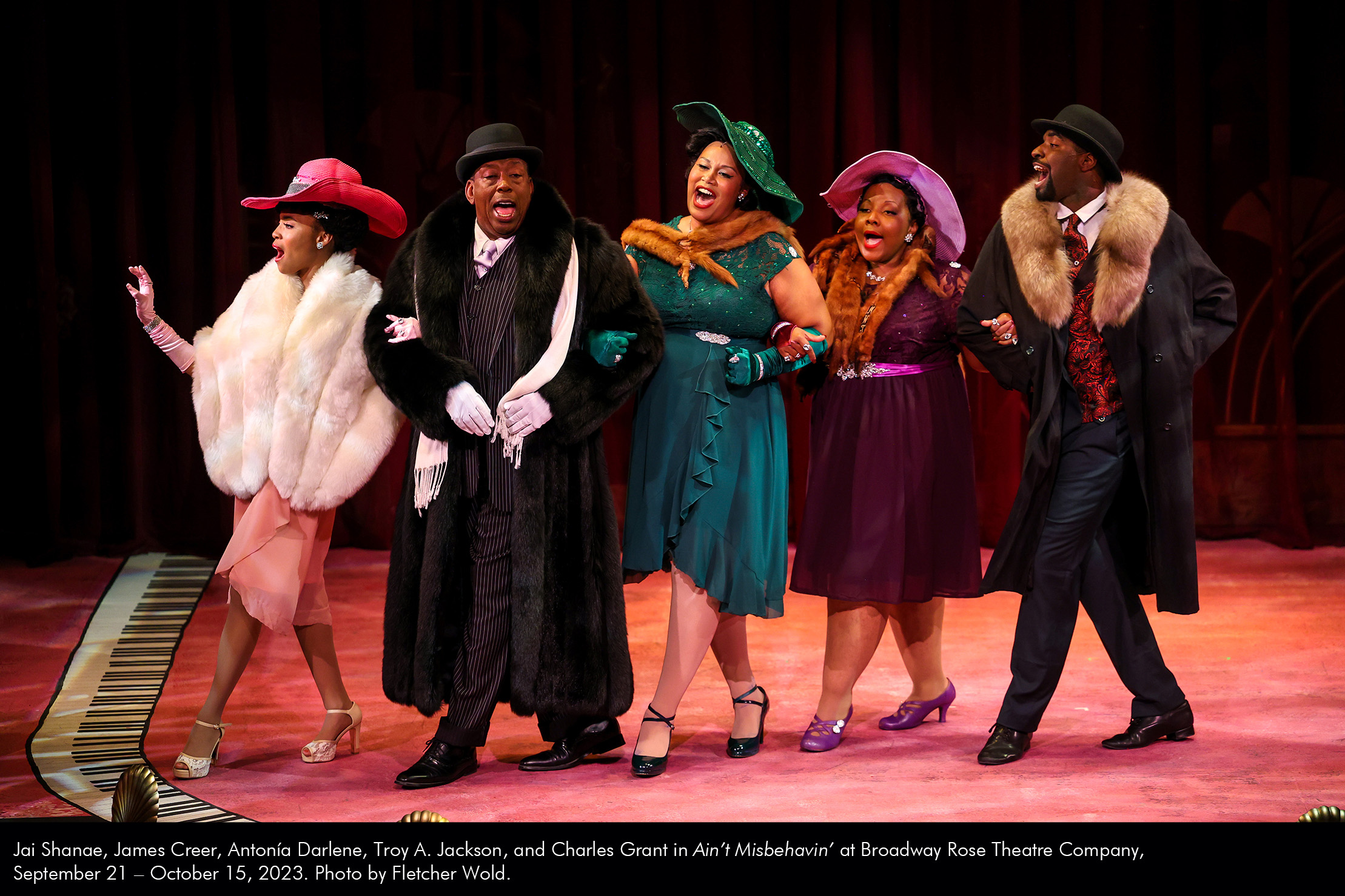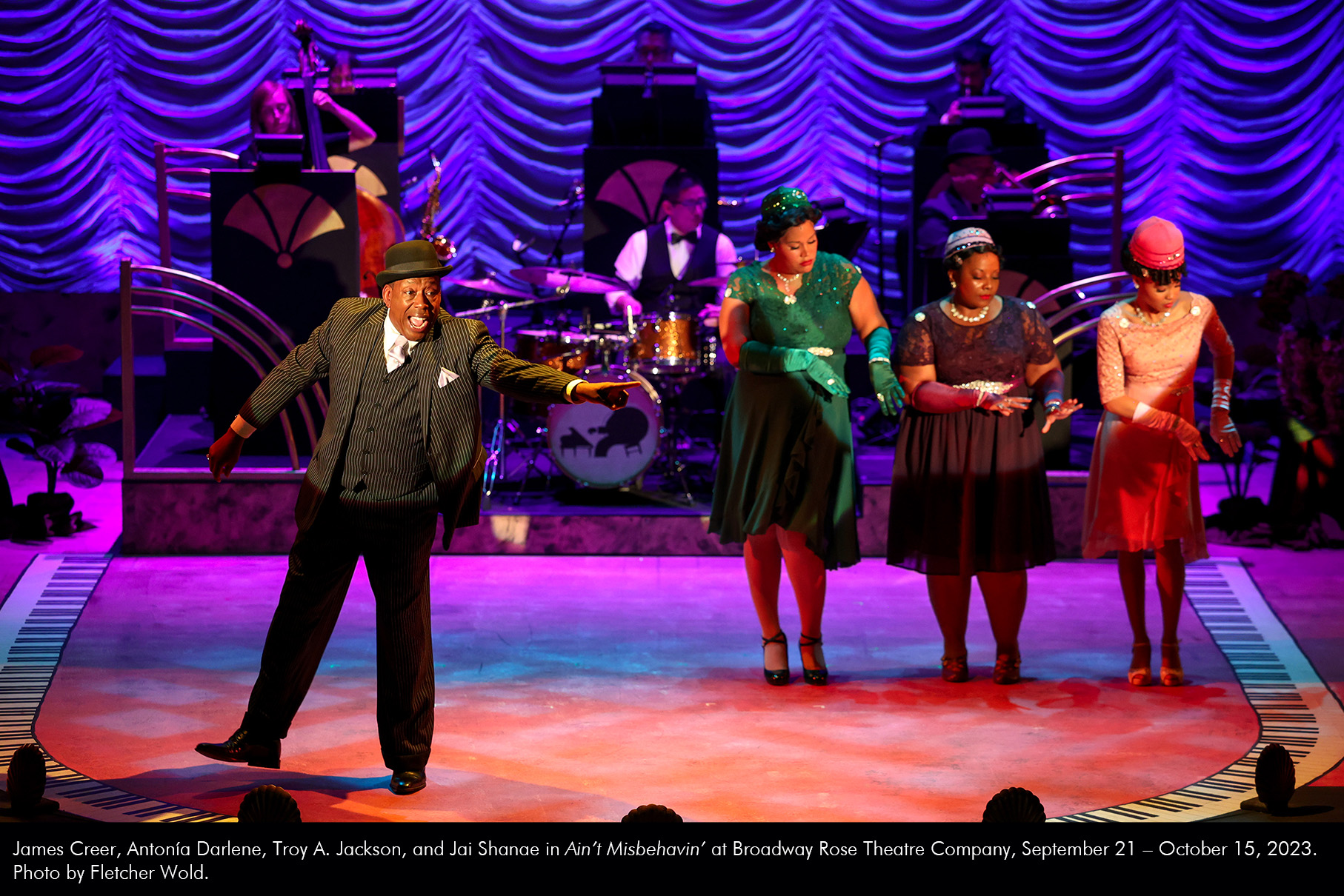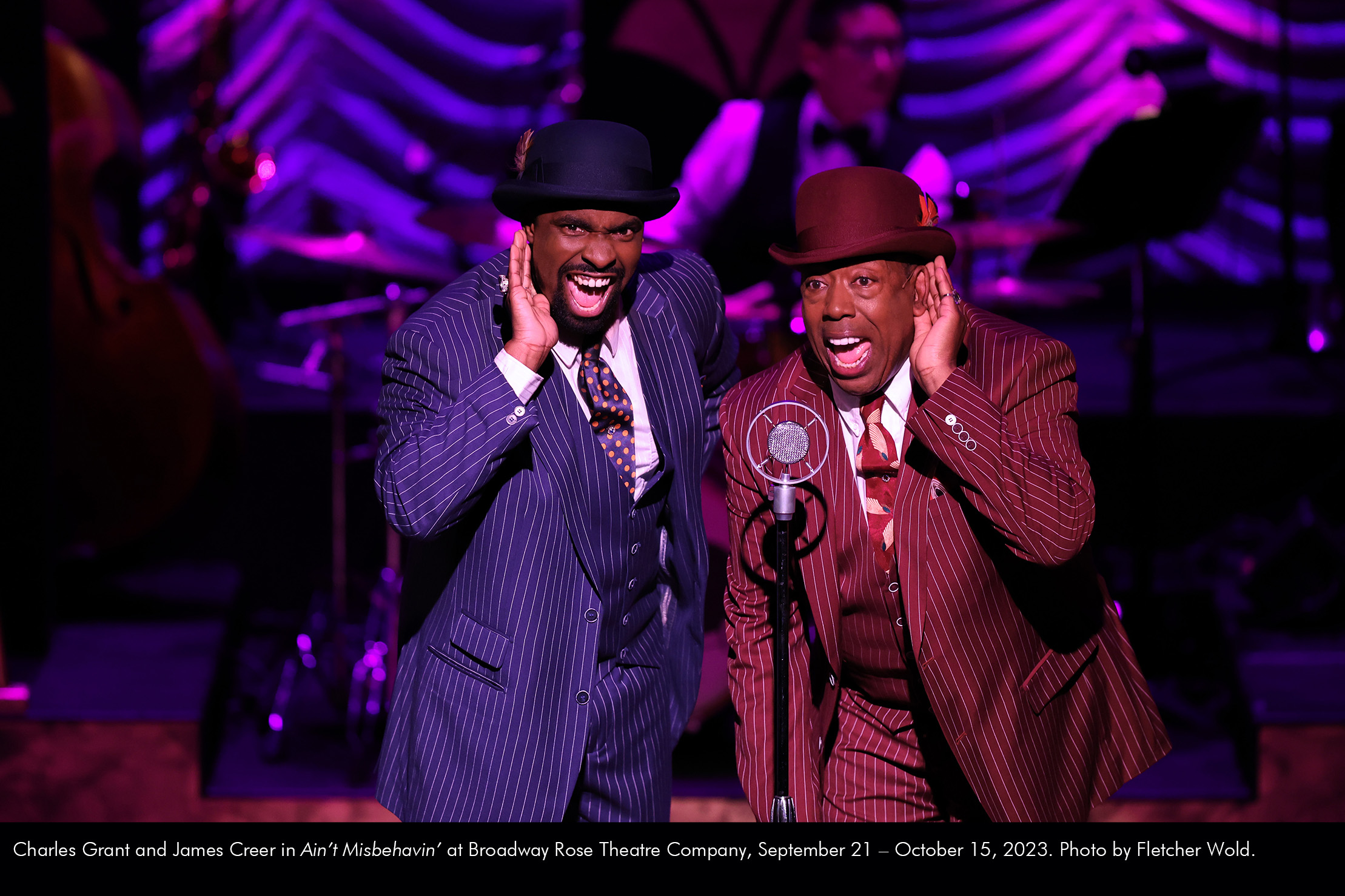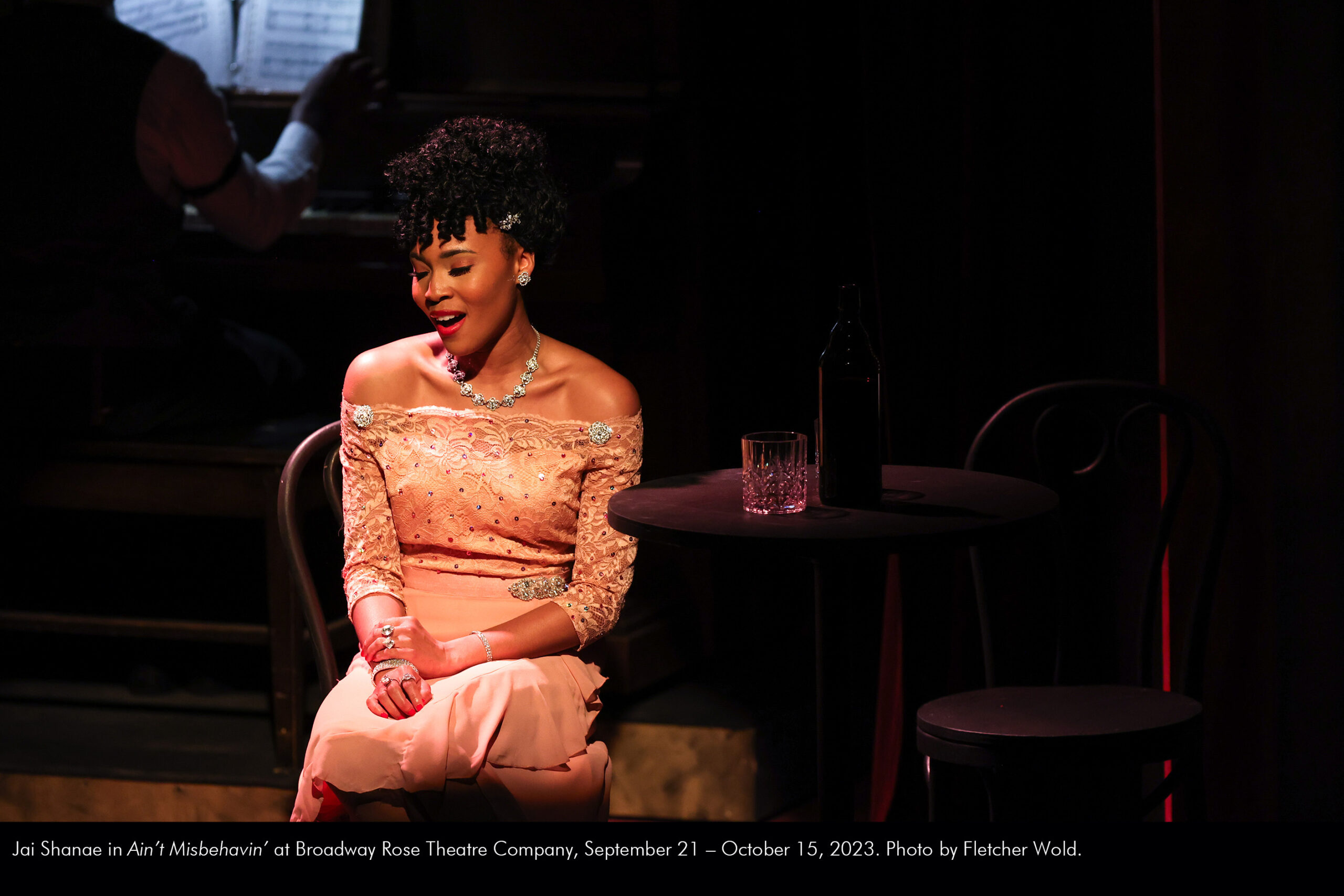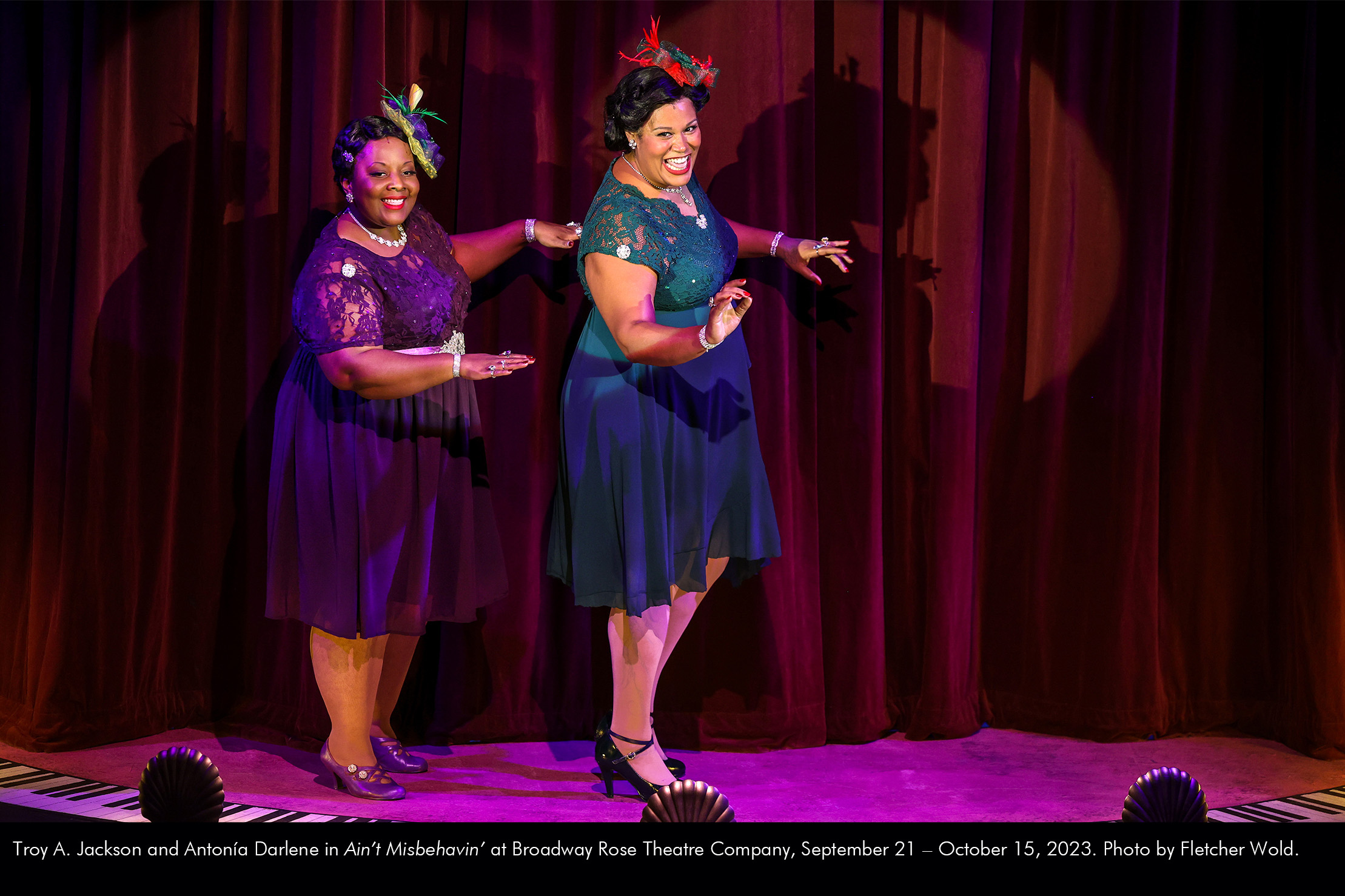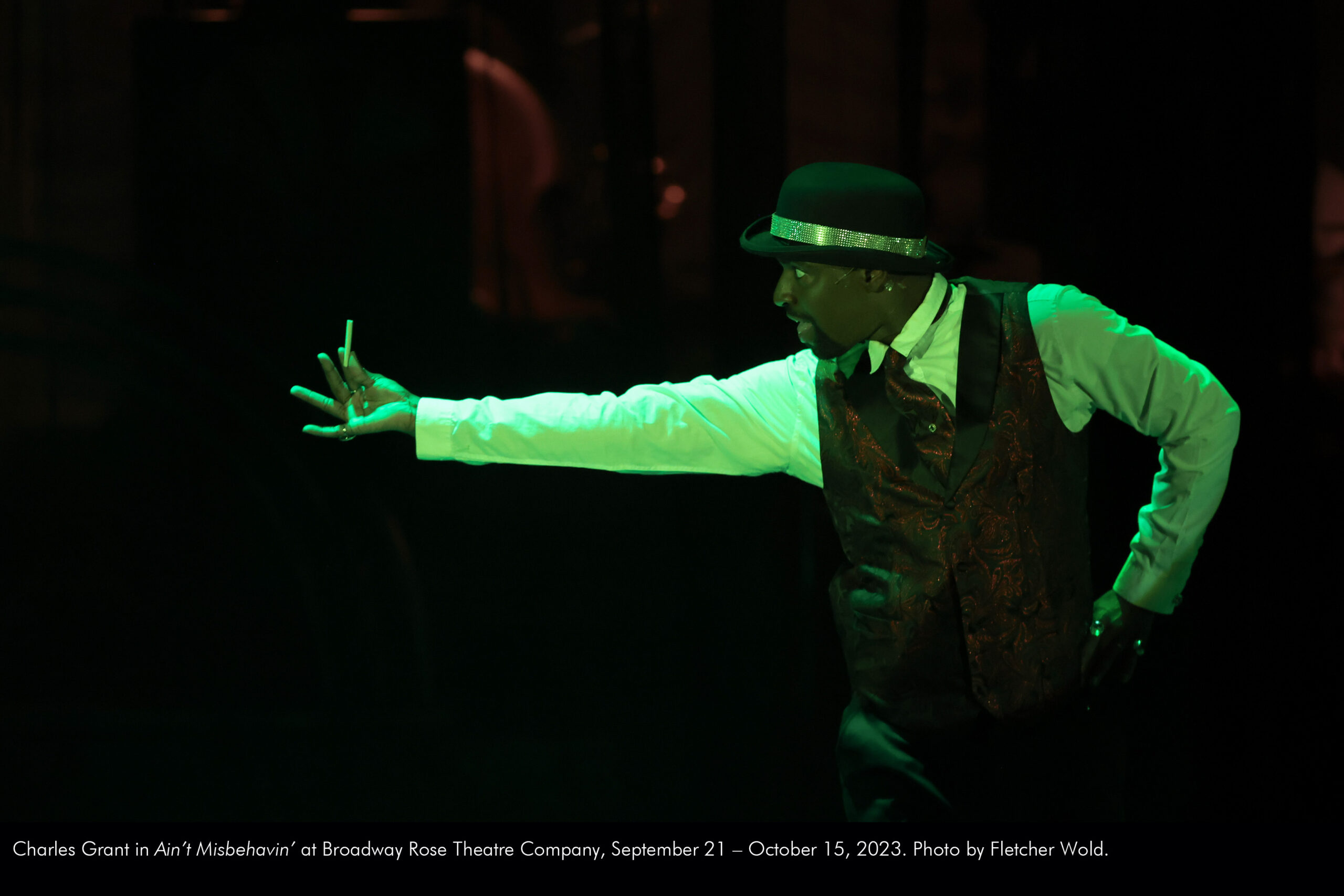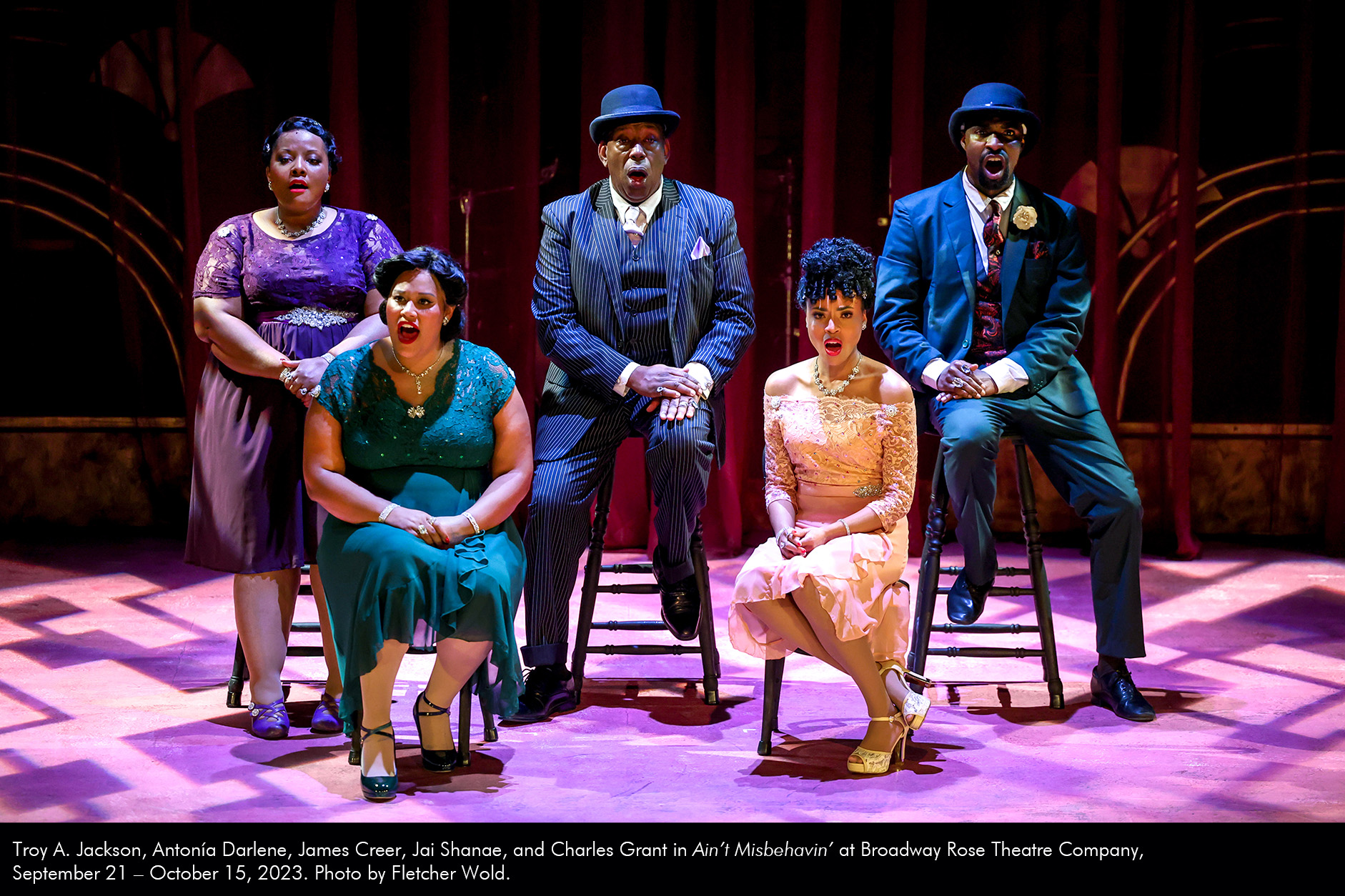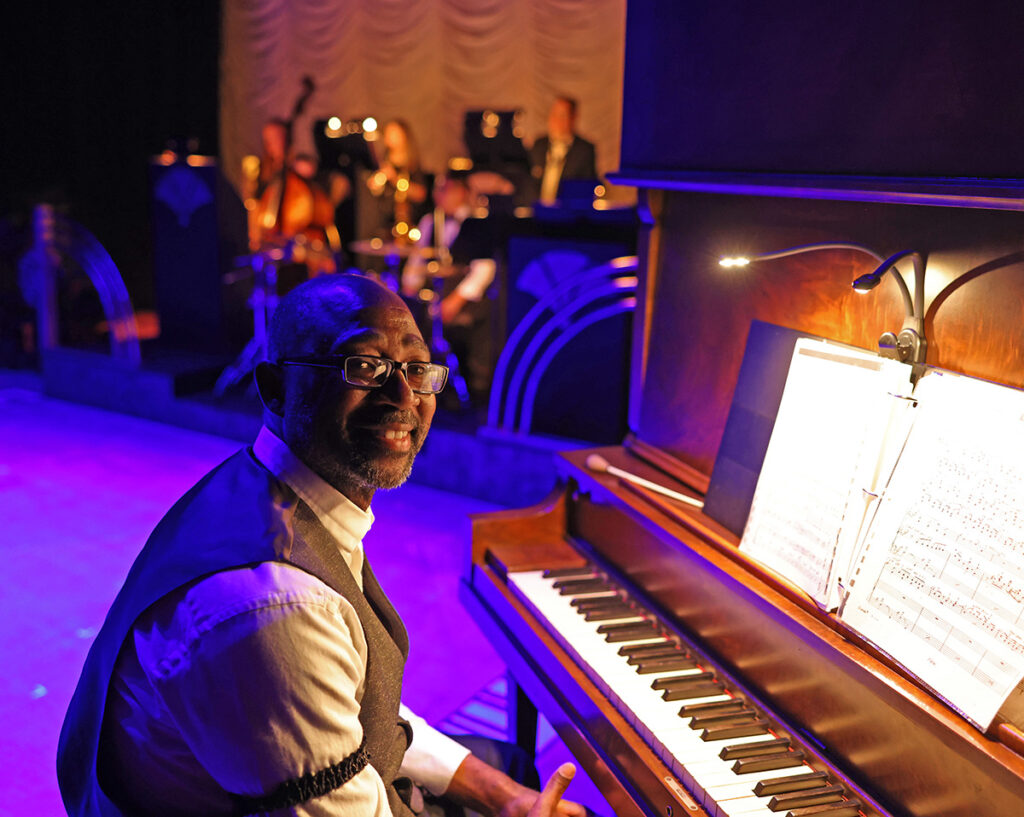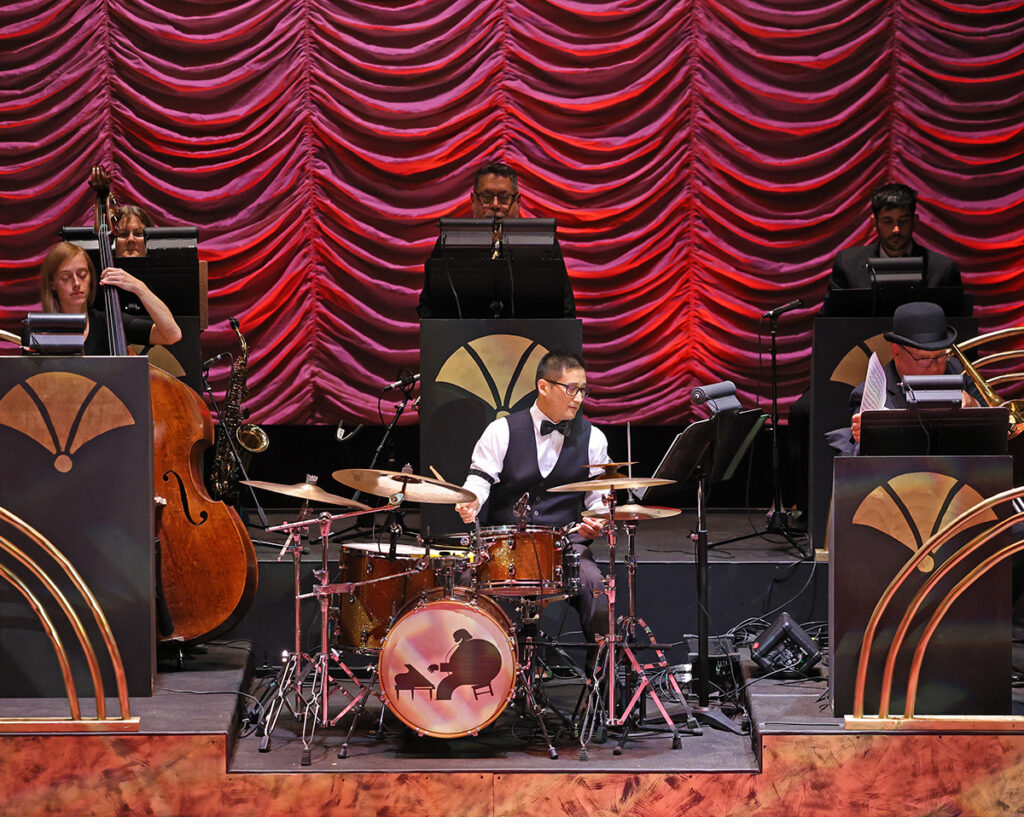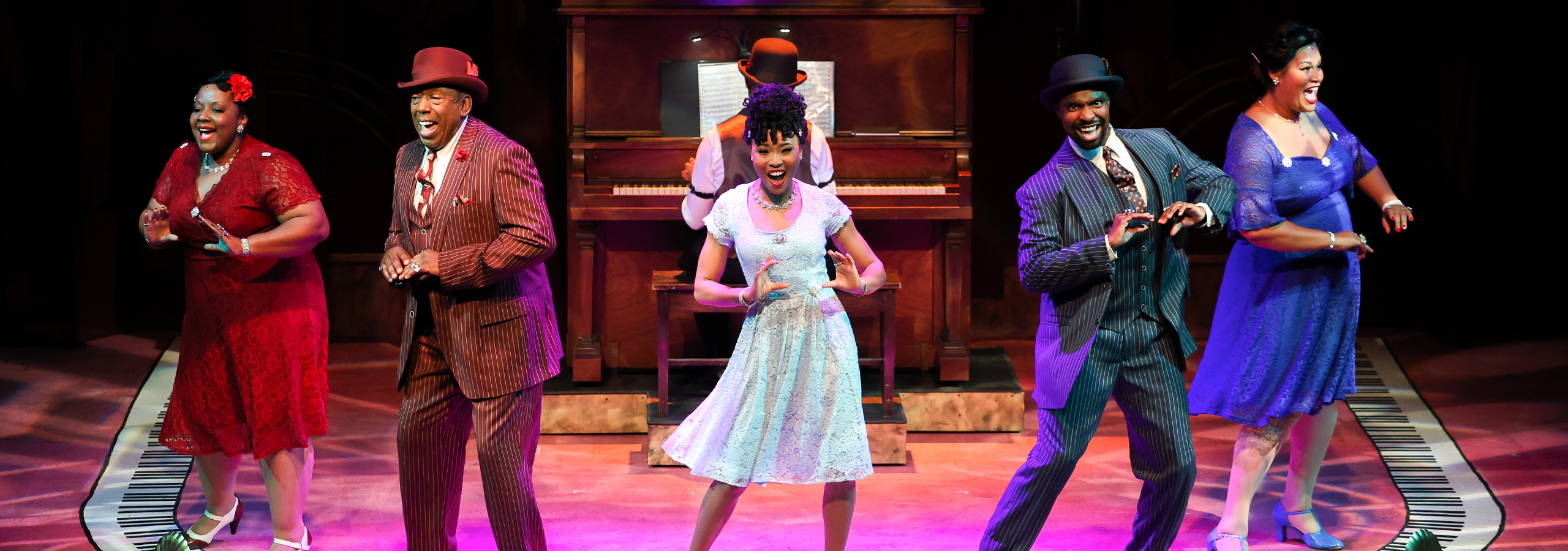
Ain’t Misbehavin’ (2023). Photo by Fletcher Wold.
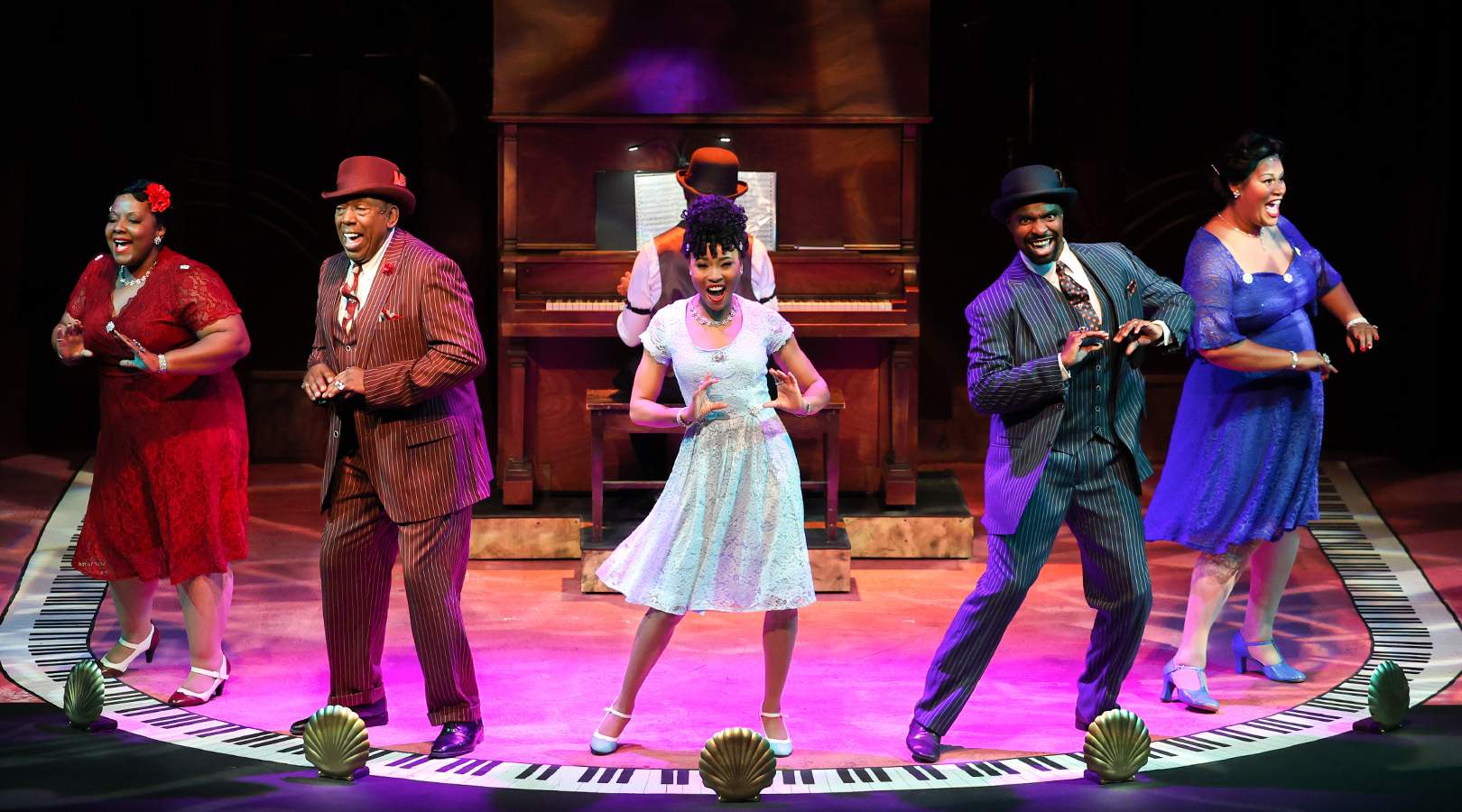
Ain’t Misbehavin’ (2023). Photo by Fletcher Wold.
September 21 – October 15, 2023
Ain’t Misbehavin’
The incomparable Thomas “Fats” Waller rose to international fame during the Golden Age of the Cotton Club and that jumpin’ new beat, swing music. Winner of the 1978 Tony Award® for Best Musical, Ain’t Misbehavin’ evokes the delightful humor and infectious energy of this American jazz legend as a versatile cast struts, strums, and sings the songs that he made famous in a career that ranged from uptown clubs to downtown, Tin Pan Alley to Hollywood, and concert stages in the U.S., Canada, and Europe.
Featuring over 30 Waller favorites including “Honeysuckle Rose,” “Black And Blue,” “The Joint Is Jumpin’,” and “I Can’t Give You Anything But Love.”
Conceived by Richard Maltby Jr. and Murray Horwitz
Created and Originally Directed by Richard Maltby, Jr.
Original Choreography and Musical Staging by Arthur Faria
Musical Adaptations, Orchestrations & Arrangements by Luther Henderson
Vocal & Musical Concepts by Jeffrey Gutcheon
Musical Arrangements by Jeffrey Gutcheon and William Elliott
Originally Produced by The Manhattan Theatre Club
Originally produced on Broadway by Emanuel Azenberg, Dasha Epstein, The Shubert Organization, Jane Gaynor and Ron Dante
Directed and Choreographed by Eugene Ware-Hill
Music Direction by William Knowles
Run time is approximately 2 hours, including one 15 minute intermission.
Performances held at the Broadway Rose New Stage,
12850 SW Grant Avenue, Tigard, OR
Cast
James Creer
James Creer is a Bay Area actor hailing from San Jose, known for his dynamic performances on both stage and solo platforms. An alumnus of Sam Houston State University, notable roles include the commanding General in Children Musical Theatre’s White Christmas and Minister Preston in Mountain View Performing Arts Center’s Jive. At Hillbarn Theatre, he appeared as Horse in The Full Monty. His diverse range was evident at Tabard Theatre, where he immersed himself in productions like I Do! I Do!, Crowns, Looking Over the President’s Shoulder, Tuesdays with Morrie, Driving Miss Daisy, and Stompin’ at the Savoy. He also performed in South Bay Musical Theatre hits including Finian’s Rainbow, Mack and Mabel, Ain’t Misbehavin’, and Guys and Dolls. He left an indelible mark in Ragtime by Broadway by the Bay. Beyond theatre, he’s been a guest artist with the Schola Cantorum of Los Altos and the San Jose Jazz Festival and debuted Brian Holmes’ operetta Fashion God in San Francisco.
Antonía Darlene
Antonía Darlene grew up in England and Germany, traveled extensively in Europe, and has cultivated a healthy love of the arts. Upon returning to the states, Antonia became very active with the theatre community in Seattle. She was the “Seasons of Love” soloist and Joanne cover in Rent, played the title character’s mother in Cinderella, and performed as Ethel Tofflemier in The Music Man at The 5th Avenue Theatre. She also participated in the original Broadway production workshops as Hanna in Come From Away. After a short hiatus to have more babies (and now with six cherubs in all), Antonía is ecstatic to be back at the Broadway Rose where you may have seen her previously as Sister Mary Hubert in Nunsense or with big hair in Beehive!
Charles Grant
Charles Grant is so excited to swing into the world of Ain’t Misbehavin’! He was last seen at the Broadway Rose as Pepper in Mamma Mia! back in 2018. As an actor, director, writer, and producer, he’s also worked with Portland Center Stage, Fuse Theatre Ensemble, Portland Playhouse, Confrontation Theatre, Staged!, and Oregon Children’s Theatre. “BIG GRATITUDE to our director Eugene and the whole cast, creative, and crew at Broadway Rose for gettin’ this joint JUMPIN’! Say hi on instagram @thecharlesgrant.”
Troy A. Jackson
Troy A. Jackson is excited about her first performance in a production at Broadway Rose Theatre. Her repertoire in regional theatre showcases remarkable roles such as Queenie in Showboat, Motormouth Maybelle in Hairspray, Bloody Mary in South Pacific, Effie in Dreamgirls, and Ronnie in Hair, among other notable performances. She also contributed her talents to the iconic Blues Brothers Show at Universal Studios Florida, where she brilliantly portrayed Mabel. Troy holds her upcoming performance as a tribute to her mother, who has been a constant support system and a guiding light in her journey. For more insights into her artistic odyssey, you can follow her on instagram @troyajacks.
Jai Shanae
Jai Shanae is a multi-talented artist native to Tampa, Florida with an impressive background in both performance and philanthropy. Jai was most recently seen in Ragtime (American Stage), The Color Purple (Stageworks Theatre), Mamma Mia! (Maples Repertory Theatre), and Guys and Dolls (Westcoast Black Theatre). Other regional credits include: Tammi Terrell in Marvin Gaye: Prince of Soul (Westcoast Black Theatre) and a Hunnie in Jelly’s Last Jam (National Black Theatre Festival). Jai also starred in the short film Killer Date Night where you’ll also find her vocals on the closing credits soundtrack. Jai studied chorus, creative writing and musical theatre at Howard W. Blake High School. She wishes to have a platform to provide a safe, artistic space for battered women and children and put an end to human-trafficking. “I am black. I am woman. I am a survivor.” @JaiShanae
Show Dates
Click on a date to purchase tickets.
Thursday, September 21, 7:30 p.m. – Preview performance – Limited availability
Friday, September 22, 7:30 p.m. – Opening night – Limited availability
Saturday, September 23, 7:30 p.m. – Limited availability
Sunday, September 24, 2:00 p.m. – SOLD OUT
Wednesday September 27, 7:30 p.m.
Thursday, September 28, 7:30 p.m. – SOLD OUT
Friday, September 29, 7:30 p.m. – Limited availability
Saturday, September 30, 2:00 p.m. – Post-show talkback – Limited availability
Saturday, September 30, 7:30 p.m. – Limited availability
Sunday, October 1, 2:00 p.m. – SOLD OUT
Wednesday, October 4, 7:30 p.m. – Limited availability
Thursday, October 5, 7:30 p.m. – Limited availability
Friday, October 6, 7:30 p.m. – Limited availability
Saturday, October 7, 2:00 p.m. – Limited availability
Saturday, October 7, 7:30 p.m. – SOLD OUT
Sunday, October 8, 2:00 p.m. – SOLD OUT
Wednesday, October 11, 7:30 p.m. – SOLD OUT
Thursday, October 12, 7:30 p.m. – SOLD OUT
Friday, October 13, 7:30 p.m. – SOLD OUT
Saturday, October 14, 2:00 p.m. – SOLD OUT
Saturday, October 14, 7:30 p.m. – SOLD OUT
Sunday, October 15, 2:00 p.m. – SOLD OUT
Creative Team
Directed and Choreographed by
Eugene Ware-Hill
Music Direction by
William Knowles
Set Design by
Eugene Ware-Hill
Costume Coordinator
Allie Schluchter-Cox
Lighting Design by
Janessa Haris
Wig Design by
Antonía Darlene
Prop Design by
Liz Carlson
Sound Design by
Brian Karl Moen
Stage Manager
Jessica Junor
Musicians
Musicians
Full Music Credits
Musical Numbers
All music by Thomas “Fats” Waller, except where (*) indicated. Songs not written by Fats Waller were recorded by him.
ACT I
Ain’t Misbehavin’* (1929)
Music by Thomas Waller and Harry Brooks
Lyrics by Andy Razaf
Lookin’ Good But Feelin’ Bad (1929)
Lyrics by Lester A. Santly
‘T Ain’t Nobody’s Biz-ness If I Do* (1922)
(The first song recorded by Fats Waller)
Music and Lyrics by Porter Grainger and Everett Robbins
Additional Lyrics by Richard Maltby, Jr. and Murray Horwitz
Honeysuckle Rose (1939)
Lyrics by Andy Razaf
Squeeze Me (1925)
Lyrics by Clarence Williams
Handful Of Keys (1933)
Lyrics by Richard Maltby, Jr. and Murray Horwitz
(based on an idea by Marty Grosz)
I’ve Got A Feeling I’m Falling* (1929)
Music by Thomas Waller and Harry Link
Lyrics by Billy Rose
How Ya Baby (1938)
Lyrics by J.C. Johnson
The Jitterbug Waltz (1942)
Lyrics by Richard Maltby, Jr.
The Ladies Who Sing With The Band
Lyrics by George Marion, Jr.
Yacht Club Swing ( 1938)
Music by Thomas Waller and Herman Autry
Lyrics by J.C. Johnson
When The Nylons Bloom Again (1943)
Lyrics by George Marion, Jr.
Cash For Your Trash (1942)
Lyrics by Ed Kirkeby
Off-Time* (1929)
Music by Thomas Waller and Harry Brooks
Lyrics by Andy Razaf
The Joint Is Jumpin‘ (1938)
Lyrics by Any Razaf and J.C. Johnson
ACT II
Spreadin’ Rhythm Around* (1935)
Music by Jimmy McHugh
Lyrics by Ted Koehler
Additional lyrics by Richard Maltby, Jr.
Lounging At The Waldorf
Lyrics by Richard Maltby, Jr.
The Viper’s Drag (1943)
”The Reefer Song” (Traditional)
Mean To Me* (1929)
Music and Lyrics by Roy Turk and Fred E. Ahlert
Your Feet’s Too Big* (1936)
Music and Lyrics by Ada Benson and Fred Fisher
That Ain’t Right* (1943)
Music and Lyrics by Nat “King” Cole
Additional Lyrics by Richard Maltby, Jr. and Murray Horwitz
Keepin’ Out Of Mischief Now (1932)
Lyrics by Andy Razaf
Find Out What They Like (1929)
Lyrics by Andy Razaf
Fat And Greasy* (1939)
Music and Lyrics by Porter Grainger and Charlie Johnson
Black And Blue* (1929)
Music by Thomas Waller and Harry Brooks
Lyrics by Andy Razaf
Finale: Songs by others which Fats Waller made hits
I’m Gonna Sit Right Down And Write Myself A Letter* (1933)
Music by Fred E. Ahlert
Lyrics by Joe Young
Two Sleepy People* (1938)
Music by Hoagy Carmichael
Lyrics by Frank Laesser
I’ve Got My Fingers Crossed*
Music by Jimmy McHugh
Lyrics by Ted Koehler
I Can’t Give You Anything But Love* (1928)
Music by Jimmy McHugh
Lyrics by Dorothy Fields
It’s A Sin To Tell A Lie* (1933)
Music and Lyrics by Billy Mayhew
Honeysuckle Band (1939)
Lyrics by Andy Razaf
Director's Notes
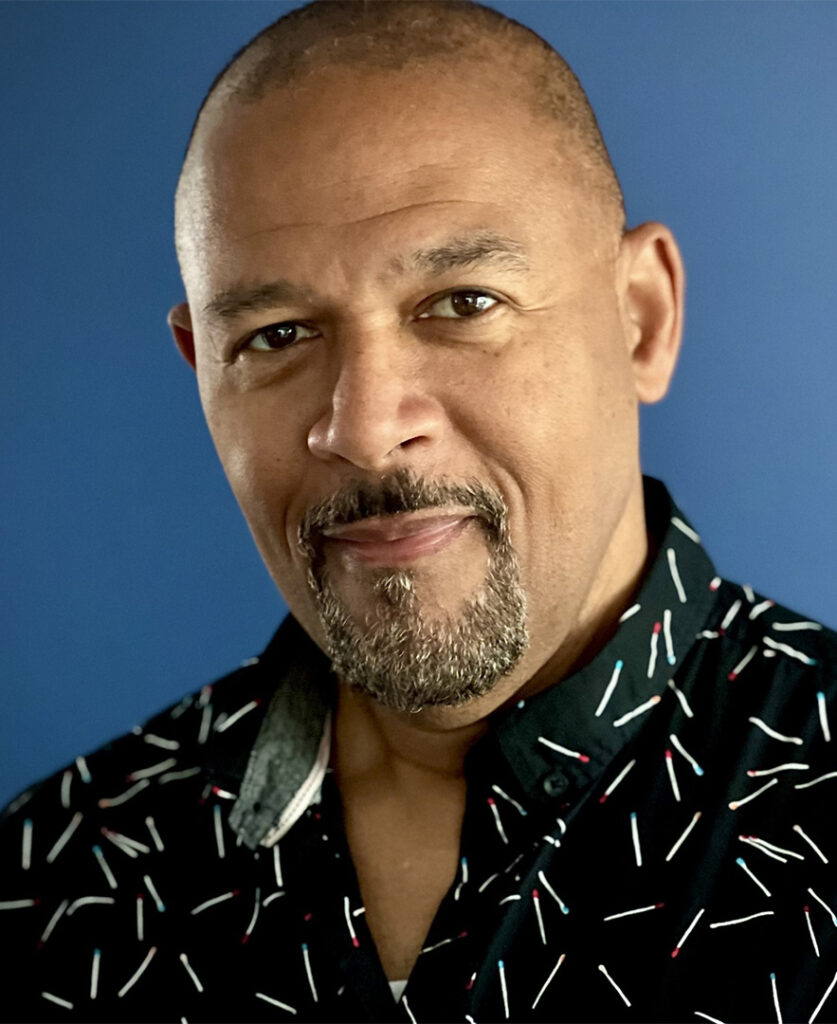 I’m grateful to Broadway Rose Theatre for allowing me to revisit Ain’t Misbehavin’, a show that has given me so much personal and professional joy. As a veteran performer in various productions of the show since the late ‘80s, I worked alongside the original creators, Director Richard Maltby and Choreographer Arthur Faria, as well as original Broadway cast members, Tony Award winner André De Shields and Armelia McQueen.
I’m grateful to Broadway Rose Theatre for allowing me to revisit Ain’t Misbehavin’, a show that has given me so much personal and professional joy. As a veteran performer in various productions of the show since the late ‘80s, I worked alongside the original creators, Director Richard Maltby and Choreographer Arthur Faria, as well as original Broadway cast members, Tony Award winner André De Shields and Armelia McQueen.
This “bookless” show evokes a bygone era of music called Tin Pan Alley, and conveys a tremendous amount of feeling and humor within the lyrics. It’s chock-full of “Wallerisms” -spoken adlibs taken directly from the ‘30s and ‘40s black and white films in which Fats Waller performed. Waller’s music remains relevant and speaks directly to issues society still struggles with today.
The title song “Ain’t Misbehavin’” opens the show. I call it “The Great Lie” because the characters spend the next two hours doing just the opposite. This production is inspired by the spirit of the original Broadway version, and I’ve assembled a talented cast of five performers representing the fingers on each hand playing stride piano. Musical Director William Knowles becomes the unofficial sixth cast member, sitting in for Fats himself. They will seduce you, charm you, and leave you bouncing in your seats. Enjoy!
– Eugene Ware-Hill
William Knowles, Music Director
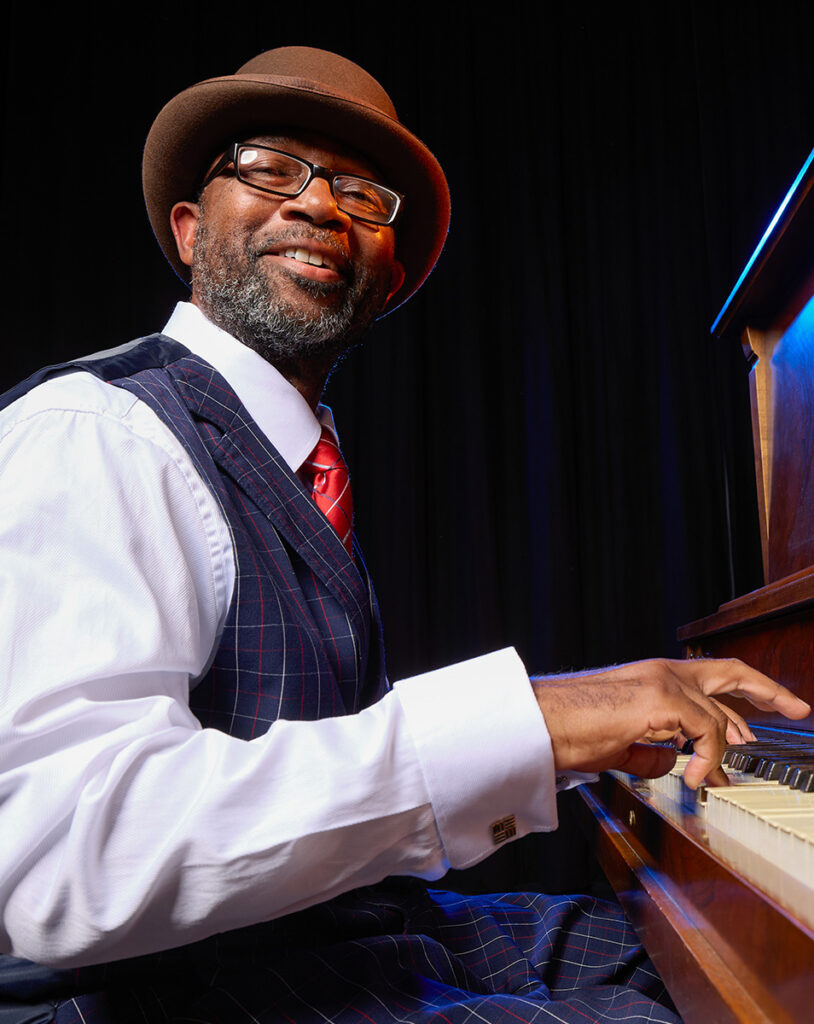 “I really like Fats Waller. He’s what they call a class act – a very exuberant being who always saw the good. But he does stop and talk to you, and in those important moments, all the shenanigans stop, and something important is said.” ~ William Knowles
“I really like Fats Waller. He’s what they call a class act – a very exuberant being who always saw the good. But he does stop and talk to you, and in those important moments, all the shenanigans stop, and something important is said.” ~ William Knowles
As a composer, arranger, music director, and pianist, William Knowles has worked at regional theaters around the country, receiving two Helen Hayes Awards and three nominations for Musical Direction. In March of 2020, William arrived in Tigard and completed one week of rehearsals for Ain’t Misbehavin’ before the pandemic shut the country down. Now, over three years later, we at Broadway Rose are thrilled to welcome William back to finish this production with us. We sat down with William to chat about his role as music director and his work on Ain’t Misbehavin’.
How did you start off in the music industry?
When I was a kid, my great grandmother had a piano. I used to beat on it until she gave it to my mother, and I took lessons. I went to the Wisconsin Conservatory of Music and played all the way through high school, then attended Howard University and majored in jazz. I went on to the University of Massachusetts and received my masters in jazz composition and arranging. After college I worked on a Royal Caribbean cruise ship for six months, then came back to Washington, D.C.
In the old days before the internet, there were these little slips of paper with job opportunities that they would put on the theater doors. My girlfriend at the time was a cello player and pianist and she took one of these little slips of paper and told me, “This one’s for you.” It was Bessie’s Blues, about Bessie Smith. So I went in and played the audition and got the job, and it just started snowballing from there. The director I worked with on that show called me again a few years later and asked me to help out with the writing on another show, and we’ve written about ten shows together since then.
And I like to play, so for about half of the year, I’m a jazz pianist in a club somewhere, and the other half of the year I’m in a theater. But I like both experiences. Playing in a club is a freer experience, but the people aren’t necessarily there to see you either. They might be there to have a nice Italian dinner. What I like about the theatre is that it’s a nice collaborative effort. It’s not just one artist – it’s all these artists together on different levels telling the same story. And that’s always been the attraction to theatre for me. In theatre we take turns telling the story – at one point, the music might be carrying the story, or something spectacular is going on with the lights or the set. I really enjoy being in that very artist heavy environment – it’s art on top of art, on top of more art. And then there are times I want get away from that and just go play in a club.
When did you first work on Ain’t Misbehavin’?
All the cats were coming out of Indianapolis, working on a 2002 Ain’t Misbehavin’ production at the Riverside Theatre in Vero Beach, Florida. The show was two weeks from opening when the music director got sick and they asked me to step in. I got the score, and I was like – “Oh, I have to practice!” Fat’s stride piano takes a bit of practice. If you don’t keep it underhand, you’ll regret it. But I did, and it worked out, and from there I just kind of kept going.
How many times have you worked on Ain’t Misbehavin’?
This will be my eighth time. I’ve done it seven times, not counting the time we started the show at Broadway Rose, prior to COVID-19. That was March of 2020. I was there for a week and half. We kept thinking we were going to shrink the show and block off the seats, and of course it kept changing. We were just about ready to assemble the band when Dan said, “If I don’t get you out, you’re not going to get home.”
I’ve done some other shows more than once, but Ain’t Misbehavin’ is the show I’ve done the most, and I enjoy it.
Are there things you’ve discovered about Ain’t Misbehavin’ each time you do it?
Every place is different. Different cities feel different, and of course the artists on the stage with you are different. We have to find our own unique way of telling the story. The people that originated the story did it their way, and you want to follow their example not by copying them, but by being yourself in this show and telling the story about this wonderful, exuberant Fats Waller person. So we have to find what that is together.
How would you describe a music director’s role?
A music director wears different hats. One hat is that I’m a performer, a piano player. One hat is that I do some teaching and alter things according to the director’s needs. Another hat is just being able to communicate well with everyone else about the musicians’ needs.
As a music director, Ain’t Misbehavin’ is also unique because a lot the time I’m on a cart and they’re rolling me around – so conducting is not traditional conducting. I’m trying to nod directions with my head while performing and to at least keep in line of sight with someone.
What advice do you have for someone considering a career as a musical director?
I guess if I were talking to a kid I would encourage them to be as proficient on an instrument as you can. Be open to different rhythms and styles. Don’t be locked into one thing. We want someone who’s fluid – who can move in and out of different styles with authenticity. That’s why jazz is a good thing to study – not that European classical music isn’t, it’s wonderful. But with jazz, there’s a certain fluidity that wasn’t necessary 300 years ago. Besides musical skills, you also have to have good communication skills, particularly if you’re a musical director. A lot of things are said that don’t make sense, musically, and you kind of have to translate requests. A director may say something to you, and you have to find a way to say it to others that makes musical sense – you find yourself translating a person’s demands in order to get what you need from the musician or actor. Once you can do those kinds of things, you’ll be working, that’s for sure.
What is your dream project?
I’ve got a closet full of musicals – I’ve written about ten. I’d love to get them out and perform them a bit more. They’re good shows – musicals on Sammy Davis, Jr., Billie Holiday, Frankie Lymon, etc. For Peace I Rise, a show on C. T. Vivian, is what I’m working on now. C. T. Vivian was sort of the architect, the strategist, really, for the civil rights movement, for Martin Luther King Jr. I’d enjoy being able to hear these musicals sung in a voice that’s not my own. So, I guess the dream is to get some of my work out there in a more consistent fashion.
Anything else you’d like to say to our audience?
I really like Fats Waller. He’s what they call a class act – a very exuberant being who always saw the good. But he does stop and talk to you. And in those important moments, all the shenanigans stop and something important is said… and then we’ll go back! So I think it will be an enjoyable experience for all of us, and I look forward to playing for you guys and meeting your audience.
Director's Notes
 I’m grateful to Broadway Rose Theatre for allowing me to revisit Ain’t Misbehavin’, a show that has given me so much personal and professional joy. As a veteran performer in various productions of the show since the late ‘80s, I worked alongside the original creators, Director Richard Maltby and Choreographer Arthur Faria, as well as original Broadway cast members, Tony Award winner André De Shields and Armelia McQueen.
I’m grateful to Broadway Rose Theatre for allowing me to revisit Ain’t Misbehavin’, a show that has given me so much personal and professional joy. As a veteran performer in various productions of the show since the late ‘80s, I worked alongside the original creators, Director Richard Maltby and Choreographer Arthur Faria, as well as original Broadway cast members, Tony Award winner André De Shields and Armelia McQueen.
This “bookless” show evokes a bygone era of music called Tin Pan Alley, and conveys a tremendous amount of feeling and humor within the lyrics. It’s chock-full of “Wallerisms” -spoken adlibs taken directly from the ‘30s and ‘40s black and white films in which Fats Waller performed. Waller’s music remains relevant and speaks directly to issues society still struggles with today.
The title song “Ain’t Misbehavin’” opens the show. I call it “The Great Lie” because the characters spend the next two hours doing just the opposite. This production is inspired by the spirit of the original Broadway version, and I’ve assembled a talented cast of five performers representing the fingers on each hand playing stride piano. Musical Director William Knowles becomes the unofficial sixth cast member, sitting in for Fats himself. They will seduce you, charm you, and leave you bouncing in your seats. Enjoy!
– Eugene Ware-Hill
William Knowles, Music Director
 “I really like Fats Waller. He’s what they call a class act – a very exuberant being who always saw the good. But he does stop and talk to you, and in those important moments, all the shenanigans stop, and something important is said.” ~ William Knowles
“I really like Fats Waller. He’s what they call a class act – a very exuberant being who always saw the good. But he does stop and talk to you, and in those important moments, all the shenanigans stop, and something important is said.” ~ William Knowles
As a composer, arranger, music director, and pianist, William Knowles has worked at regional theaters around the country, receiving two Helen Hayes Awards and three nominations for Musical Direction. In March of 2020, William arrived in Tigard and completed one week of rehearsals for Ain’t Misbehavin’ before the pandemic shut the country down. Now, over three years later, we at Broadway Rose are thrilled to welcome William back to finish this production with us. We sat down with William to chat about his role as music director and his work on Ain’t Misbehavin’.
How did you start off in the music industry?
When I was a kid, my great grandmother had a piano. I used to beat on it until she gave it to my mother, and I took lessons. I went to the Wisconsin Conservatory of Music and played all the way through high school, then attended Howard University and majored in jazz. I went on to the University of Massachusetts and received my masters in jazz composition and arranging. After college I worked on a Royal Caribbean cruise ship for six months, then came back to Washington, D.C.
In the old days before the internet, there were these little slips of paper with job opportunities that they would put on the theater doors. My girlfriend at the time was a cello player and pianist and she took one of these little slips of paper and told me, “This one’s for you.” It was Bessie’s Blues, about Bessie Smith. So I went in and played the audition and got the job, and it just started snowballing from there. The director I worked with on that show called me again a few years later and asked me to help out with the writing on another show, and we’ve written about ten shows together since then.
And I like to play, so for about half of the year, I’m a jazz pianist in a club somewhere, and the other half of the year I’m in a theater. But I like both experiences. Playing in a club is a freer experience, but the people aren’t necessarily there to see you either. They might be there to have a nice Italian dinner. What I like about the theatre is that it’s a nice collaborative effort. It’s not just one artist – it’s all these artists together on different levels telling the same story. And that’s always been the attraction to theatre for me. In theatre we take turns telling the story – at one point, the music might be carrying the story, or something spectacular is going on with the lights or the set. I really enjoy being in that very artist heavy environment – it’s art on top of art, on top of more art. And then there are times I want get away from that and just go play in a club.
When did you first work on Ain’t Misbehavin’?
All the cats were coming out of Indianapolis, working on a 2002 Ain’t Misbehavin’ production at the Riverside Theatre in Vero Beach, Florida. The show was two weeks from opening when the music director got sick and they asked me to step in. I got the score, and I was like – “Oh, I have to practice!” Fat’s stride piano takes a bit of practice. If you don’t keep it underhand, you’ll regret it. But I did, and it worked out, and from there I just kind of kept going.
How many times have you worked on Ain’t Misbehavin’?
This will be my eighth time. I’ve done it seven times, not counting the time we started the show at Broadway Rose, prior to COVID-19. That was March of 2020. I was there for a week and half. We kept thinking we were going to shrink the show and block off the seats, and of course it kept changing. We were just about ready to assemble the band when Dan said, “If I don’t get you out, you’re not going to get home.”
I’ve done some other shows more than once, but Ain’t Misbehavin’ is the show I’ve done the most, and I enjoy it.
Are there things you’ve discovered about Ain’t Misbehavin’ each time you do it?
Every place is different. Different cities feel different, and of course the artists on the stage with you are different. We have to find our own unique way of telling the story. The people that originated the story did it their way, and you want to follow their example not by copying them, but by being yourself in this show and telling the story about this wonderful, exuberant Fats Waller person. So we have to find what that is together.
How would you describe a music director’s role?
A music director wears different hats. One hat is that I’m a performer, a piano player. One hat is that I do some teaching and alter things according to the director’s needs. Another hat is just being able to communicate well with everyone else about the musicians’ needs.
As a music director, Ain’t Misbehavin’ is also unique because a lot the time I’m on a cart and they’re rolling me around – so conducting is not traditional conducting. I’m trying to nod directions with my head while performing and to at least keep in line of sight with someone.
What advice do you have for someone considering a career as a musical director?
I guess if I were talking to a kid I would encourage them to be as proficient on an instrument as you can. Be open to different rhythms and styles. Don’t be locked into one thing. We want someone who’s fluid – who can move in and out of different styles with authenticity. That’s why jazz is a good thing to study – not that European classical music isn’t, it’s wonderful. But with jazz, there’s a certain fluidity that wasn’t necessary 300 years ago. Besides musical skills, you also have to have good communication skills, particularly if you’re a musical director. A lot of things are said that don’t make sense, musically, and you kind of have to translate requests. A director may say something to you, and you have to find a way to say it to others that makes musical sense – you find yourself translating a person’s demands in order to get what you need from the musician or actor. Once you can do those kinds of things, you’ll be working, that’s for sure.
What is your dream project?
I’ve got a closet full of musicals – I’ve written about ten. I’d love to get them out and perform them a bit more. They’re good shows – musicals on Sammy Davis, Jr., Billie Holiday, Frankie Lymon, etc. For Peace I Rise, a show on C. T. Vivian, is what I’m working on now. C. T. Vivian was sort of the architect, the strategist, really, for the civil rights movement, for Martin Luther King Jr. I’d enjoy being able to hear these musicals sung in a voice that’s not my own. So, I guess the dream is to get some of my work out there in a more consistent fashion.
Anything else you’d like to say to our audience?
I really like Fats Waller. He’s what they call a class act – a very exuberant being who always saw the good. But he does stop and talk to you. And in those important moments, all the shenanigans stop and something important is said… and then we’ll go back! So I think it will be an enjoyable experience for all of us, and I look forward to playing for you guys and meeting your audience.
Spreadin' Rhythm Around Art Exhibition
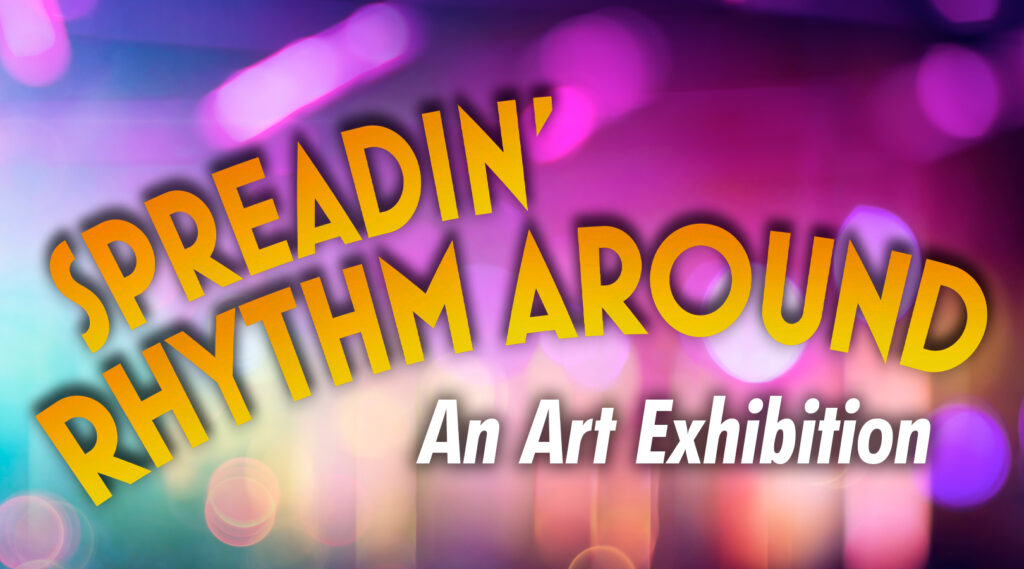
September 21 – October 15
Broadway Rose proudly presents our 3rd annual art exhibition, featuring the works of regional Black artists.
Ain’t Misbehavin’ pays tribute to the incomparable Thomas “Fats” Waller who rose to international fame during the Harlem Renaissance, the Golden Age of the Cotton Club, and that jumpin’ new beat, swing music.
Described by his writing partner Andy Razaf as “the soul of melody” and a “bubbling bundle of joy,” Fats Waller viewed life as a journey meant for pleasure and play. Through themes of joy, humor, creativity, musical expression, and, of course, jazz, this exhibition seeks to celebrate Waller’s joie de vivre as well as the explosion of creativity and innovation from the Black artists that defined the Harlem Renaissance.
Art, music, and culture as we know it today would not exist without the countless contributions and artistry of Black creatives through the ages. We invite you to enjoy the voices and perspectives of Black visual artists within our community.
Featuring works from artists Marvin Eans, Dominic Harris, Lisa Jarrett, Niema Lightseed, Alice Price, Philip A. Robinson, Jr., and Arvie Smith.
Exhibition curated by Amaya Santamaría and Dani Wright.
View the book of the artists and their works featured in Spreadin’ Rhythm Around.
About Thomas "Fats" Waller
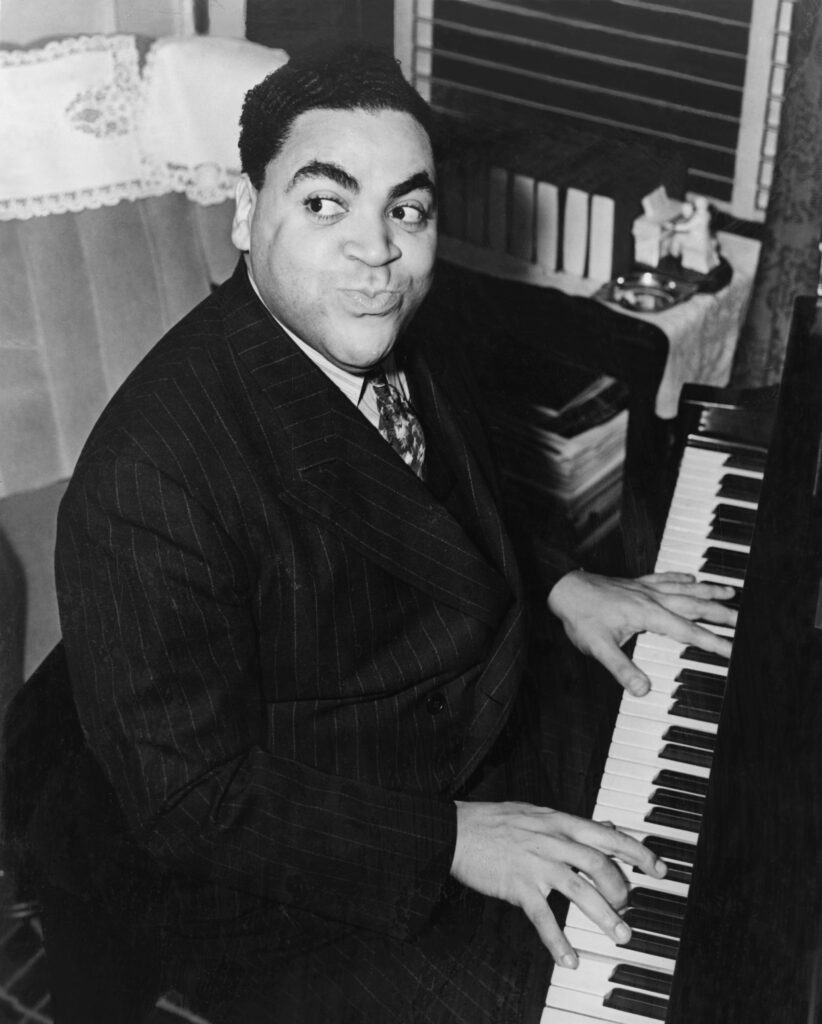 “Jazz isn’t what you do; it’s how you do it.” ~ Fats Waller
“Jazz isn’t what you do; it’s how you do it.” ~ Fats Waller
Thomas Wright “Fats” Waller was an African American jazz pianist, organist, composer, and entertainer born on May 21, 1904, in Harlem, New York. Although Waller’s skills as a jazz musician were phenomenal, his commercial success is attributed to his humor and slapstick comedy.
The son of a clergyman and a church organist, Waller was introduced to music at a young age. Fats studied classical piano and organ before apprenticing himself to legendary Harlem stride pianist James P. Johnson. Johnson taught Waller the stride style which would launch his jazz career and introduced Fats to the world of rent parties (a party with a piano player, designed to enable the player to help pay the rent by charging guests), and soon he developed a performing career.
Fats was an excellent pianist, usually considered one of the very best in the stride style, but his songwriting and lovable, roguish stage personality (“One Never Knows, Do One?”) overshadowed his playing.
Stride piano imitates the sound of a band, with the left hand substituting for bass and drum and the right hand playing the melody. The style was melodic while allowing ample room for improvisation, which is why Fats preferred stride piano as his musical medium.
“Concentrate on the melody,” Fats suggested. “If it’s good, you don’t have to shoot it out of a cannon. Jimmie Johnson taught me that. You got to hang onto the melody and never let it get boresome.”
Before Fats’ solo career, he played with many notable performers from Erskine Tate to Bessie Smith, but his greatest success came with his own five or six piece combo, Fats Waller and His Rhythm. Among his songs are “Squeeze Me,” “Ain’t Misbehavin’,” “Blue Turning Grey Over You,” “Honeysuckle Rose,” “I’ve Got A Feeling I’m Falling,” and “The Jitterbug Waltz.”
By the early 1940s, Waller was making a comfortable living as an entertainer, had collaborated on several musicals, and had written a Broadway musical for a predominately white cast: Early to Bed.
Waller was a prolific songwriter and found success both at home and abroad, with a large fan base in Europe. Though his life ended prematurely at the age of 39, his work influenced countless jazz artists, including Thelonious Monk and Count Basie.
Fats Waller has received many posthumous honors. His recordings of “Ain’t Misbehavin’” and “Honeysuckle Rose” were inducted into the Grammy Hall of Fame, while Fats himself received a Grammy Lifetime Achievement Award in 1993, and is listed in the Songwriters Hall of Fame and the Big Band and Jazz Hall of Fame.
Sources:
- nytimes.com
- britannica.com
- thoughtco.com
- mtishows.com
About Thomas "Fats" Waller
 “Jazz isn’t what you do; it’s how you do it.” ~ Fats Waller
“Jazz isn’t what you do; it’s how you do it.” ~ Fats Waller
Thomas Wright “Fats” Waller was an African American jazz pianist, organist, composer, and entertainer born on May 21, 1904, in Harlem, New York. Although Waller’s skills as a jazz musician were phenomenal, his commercial success is attributed to his humor and slapstick comedy.
The son of a clergyman and a church organist, Waller was introduced to music at a young age. Fats studied classical piano and organ before apprenticing himself to legendary Harlem stride pianist James P. Johnson. Johnson taught Waller the stride style which would launch his jazz career and introduced Fats to the world of rent parties (a party with a piano player, designed to enable the player to help pay the rent by charging guests), and soon he developed a performing career.
Fats was an excellent pianist, usually considered one of the very best in the stride style, but his songwriting and lovable, roguish stage personality (“One Never Knows, Do One?”) overshadowed his playing.
Stride piano imitates the sound of a band, with the left hand substituting for bass and drum and the right hand playing the melody. The style was melodic while allowing ample room for improvisation, which is why Fats preferred stride piano as his musical medium.
“Concentrate on the melody,” Fats suggested. “If it’s good, you don’t have to shoot it out of a cannon. Jimmie Johnson taught me that. You got to hang onto the melody and never let it get boresome.”
Before Fats’ solo career, he played with many notable performers from Erskine Tate to Bessie Smith, but his greatest success came with his own five or six piece combo, Fats Waller and His Rhythm. Among his songs are “Squeeze Me,” “Ain’t Misbehavin’,” “Blue Turning Grey Over You,” “Honeysuckle Rose,” “I’ve Got A Feeling I’m Falling,” and “The Jitterbug Waltz.”
By the early 1940s, Waller was making a comfortable living as an entertainer, had collaborated on several musicals, and had written a Broadway musical for a predominately white cast: Early to Bed.
Waller was a prolific songwriter and found success both at home and abroad, with a large fan base in Europe. Though his life ended prematurely at the age of 39, his work influenced countless jazz artists, including Thelonious Monk and Count Basie.
Fats Waller has received many posthumous honors. His recordings of “Ain’t Misbehavin’” and “Honeysuckle Rose” were inducted into the Grammy Hall of Fame, while Fats himself received a Grammy Lifetime Achievement Award in 1993, and is listed in the Songwriters Hall of Fame and the Big Band and Jazz Hall of Fame.
Sources:
- nytimes.com
- britannica.com
- thoughtco.com
- mtishows.com
News & Reviews
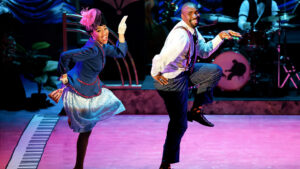 Fats Waller and the joys of misbehavin’
Fats Waller and the joys of misbehavin’
by Bob Hicks
orartswatch.org, September 25, 2023
Broadway Rose Theatre pulls out all the stops on the sizzling revue Ain’t Misbehavin’, a celebration of Waller’s music and milieu… Read more.
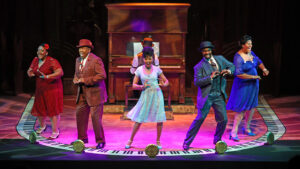 Review: AIN’T MISBEHAVIN’ at Broadway Rose
Review: AIN’T MISBEHAVIN’ at Broadway Rose
by Krista Garver
broadwayworld.com, October 4, 2023
A New York Times review of the revival of AIN’T MISBEHAVIN’ called it a “between-the-wars dream world.” The production on stage right now at Broadway Rose feels the same… Read more.
Content Advisories
Click here for our pre-viewing guide for sensory- and content-sensitive patrons (PDF).
Ain’t Misbehavin’ is presented through special arrangement with Music Theatre International (MTI). All authorized performance materials are also supplied by MTI. www.mtishows.com

